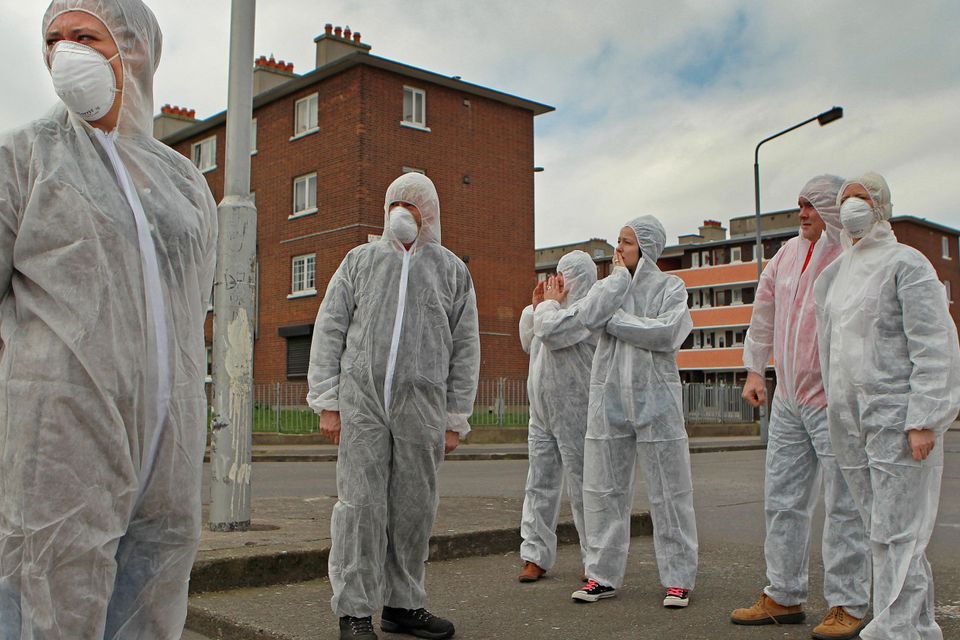European watchdogs partially back complaints from people living in Ireland's most run-down estates
Report finds estates are inadequate and standards have deteriorated since the economic crisisGovernment has failed to take sufficient and timely measuresCommittee refused to uphold complaints that people were being discriminated against
Residents of Dolphin House protest dressed in biohazard suits to illustrate problems with damp and sewerage
People living in 20 of the most run-down housing estates in the country have won a partial victory over demands for basic living conditions.
European watchdogs backed a collective complaint and warned that some residents, including a high number of those in Dolphin House in Dublin, are living with sewage invasion years after the problems were first reported.
They said conditions are so poor in some council complexes that people live with contaminated water, dampness and persistent mould.
The report by the European Committee of Social Rights, part of the 47 nation Council of Europe, found a number of estates are inadequate and standards have deteriorated since the economic crisis.
"The committee finds that the Government has failed to take sufficient and timely measures to ensure the right to housing of an adequate standard for not an insignificant number of families living in local authority housing," it said.
The watchdogs also warned there is no national timetable for local authority housing to be refurbished and that the last state survey of standards was 15 years ago.
They said many regeneration schemes were shelved after 2008.
Dublin City Council had plans to revive 12 large disadvantaged inner city estates with 11,000 flats but all those were halted or delayed in the recession, except for Fatima Mansions which was virtually complete.
But the committee refused to uphold complaints that people living in many of the estates were being discriminated against or that their health, in particular those in Dolphin House, was affected specifically by poor housing.
The complaint was lodged in 2014 by the Paris-based International Federation for Human Rights on behalf of 130,000 residents in estates in inner city Dublin and Limerick over sewage problems, persistent leaks, damp and mould.
It highlighted conditions in estates like Dolphin House, St Theresa's Gardens, Charlemont Street and Bridgefoot Street in Dublin's south inner city and O'Devaney Gardens, Dominick St, Croke Villas in the north inner city, among others.
Surveys carried out on residents in Dolphin House in 2012 revealed a risk of lung disease and nine out of 10 children missing school days because of the impact of damp, mould and sewage.
Some people in the flats reported breathing difficulties, diarrhoea, skin rashes and depression due to the poor conditions.
The committee found some of the health issues were temporary and subjective and that the complaint did not sufficiently demonstrate that health issues were directly caused by poor living conditions.
The landmark case was taken under the European Social Charter, a Council of Europe treaty which guarantees social and economic human rights and that Ireland signed up to in 2000.
Debbie Mulhall, who has lived at Dolphin House all her life, said she had been vindicated.
"For years, tenants have put forward proof that we are living in unacceptable, unhealthy and uninhabitable conditions," she said.
"This has been constantly disputed.
"We have been consistently told that the dire conditions are of our own making, that persistent damp and mould is caused because of drying clothes or steaming pots, for example.
"This decision puts an end to this and finds that our right to housing of an adequate standard has been violated."
Cecilia Forrestal, of Community Action Network, said the ruling demanded a serious response.
"Nobody wants to see Irish state housing being run down," she said.
"These Irish citizens have a right to a decent home, in particular the children living in state housing."
Join the Irish Independent WhatsApp channel
Stay up to date with all the latest news















